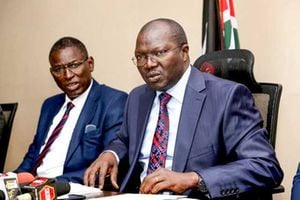Mr Cabinet secretary, let the competent managers at NSSF run fund’s affairs

View of a section of the Tassia II Settlement Scheme. Two NSSF board members have questioned the manner in which Sh5 billion was allocated for the area's infrastructure development. January 12, 2014. Photo/ JEFF ANGOTE/NATION
What you need to know:
- Employers, who are represented on the board, have nothing but the best interests of workers at heart.
- It is unfortunate that the Cabinet secretary has not built on FKF goodwill and is instead resorting to unfounded accusations.
A recent article by the Cabinet secretary for Labour and Social Security, Mr Kazungu Kambi, on the need to embrace dialogue for the good of National Social Security Fund (NSSF) and the ministry makes interesting reading. The commentary, which was intended to lament the perennial challenges that face the NSSF, however only served to highlight the fact that the Cabinet secretary is yet to appreciate the kind of organisation the NSSF is and the fact that his decision to run its affairs through the media is in itself an affront to dialogue.
The National Social Security Fund was initiated by workers’ and employers’ representatives in the 1960s to address the problem of employees who were retiring without adequate terminal benefits or income. There is, therefore, nothing amiss if workers and employers, who are the sole contributors to the fund, work together towards ensuring that their money is well managed. What do the workers of this country stand to gain from the Tassia II project?
Rather than engage in a war of words over the “cancelled” project, the Cabinet secretary should move fast to ensure that NSSF quickly deals with the credibility issues it keeps grappling with due to political interference. The past deliberations of the NSSF board are, of course, available to him either directly or through the ministry representatives who sit in the board. It is also a matter of public knowledge the issues the Federation of Kenya Employers (FKE) has raised over the years about the running of NSSF.
Employers, who are represented on the board, have nothing but the best interests of workers at heart. That is the sole reason for their support of enhanced contributions in the new NSSF Act so that workers can live comfortable lives after retirement. The standoff over Tassia II could easily have been avoided if the NSSF board had called a meeting to determine the project’s viability, as FKE had requested.
There are, indeed, competent managers at the NSSF who must be allowed to professionally run the fund. The Cabinet secretary must, therefore, explain to Kenyans why he is the face of Tassia II and why he is the one strenuously defending the project which is under investigation by two committees of Parliament and the Ethics and Anti-Corruption Commission. He should also explain if he is now the one running the affairs of the NSSF board of trustees.
The idea that FKE and the Central Organisation of Trade Unions (Cotu) should not have a “vibrant strong alliance” is totally against the spirit of tripartism, which the Cabinet secretary himself is supposed to champion. Need we mention that FKE is an independent and non-partisan champion of the interest of employers in Kenya and cannot be influenced on which associations or alliances to engage in? Employers are independent and non-government members on the NSSF board and the Cabinet secretary should not attempt to deride their representatives and those of workers’ in the court of public opinion merely because they have asked that the right procedure be followed in investing workers’ pension funds.
Employers value dialogue as the best way to address economic and social issues of common interest. This is the bedrock on which our industrial relations system is founded. The management board of FKE was among the first delegations to pay a courtesy call on the Cabinet secretary when he formally took office. We presented to him a memorandum of employers’ priorities. It is unfortunate that the Cabinet secretary has not built on this goodwill and is instead resorting to unfounded accusations.
FKE wrote to the chairman and the acting managing trustee in December 2013, asking them to call a meeting to discuss the Tassia II project. This was an attempt to have the board formally convened to address the issues that arose. Sadly, FKE did not receive any response to this communication, nor was a meeting convened. It is, therefore, dishonest for the Cabinet secretary to preach the spirit of dialogue when he selectively chooses when to embrace it.
Given that the Tassia II project is currently under investigation and that the Cabinet secretary purportedly “cancelled” the project, we would like to know why he is still discussing it in the media.
Ms Mugo is the Executive Director of the Federation of Kenya Employers





